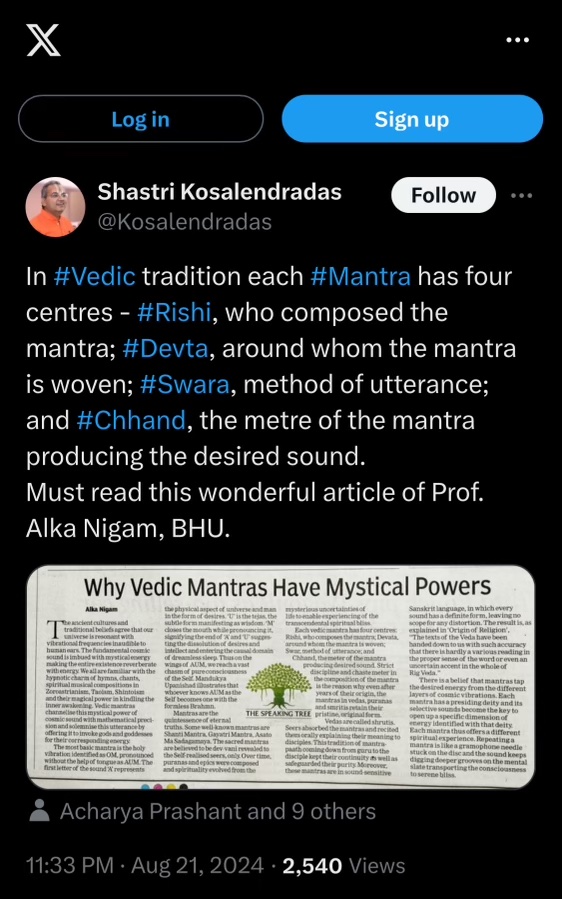Reach the point where there is room for none other than the One, where you are free of all trappings, writes Alka Nigam
Using religion as a crutch we climb the stairs of the growth of self and when we reach the summit we don’t need religion any longer. Its rituals and holy books become redundant. Only light, love and infinite vastness remain and in that ethereal light smiles your god. At that level even the sense of Self melts away. As Kabir puts it: “The alley of love is so narrow that it has no place for two, when the Lord is there you cannot be and when you are there no space is left for the Lord.”
Religion teaches, trains, guides and prepares for final consummation and the moment it happens it breaks the narrow circumference of its name. All religions of the world take us to the same destination. That is why there is an underlying similarity in all religions. Many religious rituals and beliefs manifest themselves in different forms of universal traditions and need only to be explicated to know the similarity underneath. For example, the Bible speaks of the fall of man, while Vedanta speaks of the fall of God from an absolute state of perfection to an apparent finitude.
The concept of superman of Nietzsche points out to the jivanmukhta in Vedas, jina in Jainism and boddhisatva in Buddhism. The Catholic Church has preserved the idea of motherhood embodied in benevolent Hindu deities. The concept of Trinity—Father, Son and the Holy Ghost—is not very different from the Hindu thought –Om Tat Sat. Moses is accepted as a prophet in Islam, as author of Torah in Judaism and as lawgiver in the Book of Exodus. The importance of the inscription, “Know Thyself” inscribed at the Greek Temple of Delphi has been acknowledged by Shankaracharya. The idea of a personal god gives rise to the seeker’s relation to the Divine as that of a beloved to a lover just as Radha saw Him as a lover;, a servant to a master the way Brother Lawrence regarded himself as God’s servant; a son to a father just as to Jesus God was a father and to Ramakrishna, mother; a friend to a friend the wayArjuna saw God as a friend and a wife to a husband in the same way as Meerabai saw Krishna, as her beloved husband.
The concept of third eye in Hindu thought is referred to by Christ when he said. “Let your two eyes become single and there will be light.” The third eye opens the intuition through a star, which perhaps guided the three Magi from the East on their arduous journey to the stable where Christ was born. The gong of the Church and bells in the temple recreate astral sounds, which culminate in the sacred syllable Aum. In the Vedas, Aum the symbol of God recognised by Muslims who conclude their namaz with “Amin” and Christians who conclude their prayers with “Amen.” Similarly, repeating the Name while chanting with rosary beads is a common practice in almost all religions.
The mystical experiences of masters of various religions reveal primeval truths to which no one person or age or religion can make exclusive claim. It is because the spiritual essence is already there deep within all of us and can be realised in our pure consciousness when the individual self fades away.
In their attempt to unravel the mystery of life and death, Western mystics of radically different milieu, secure the same rapport with the central spiritual reality, as could the sages of Tibet, China or India. The state of ecstasy experienced by Sri Yogananda: “My sense of identity was no longer narrowly confined to a body…An oceanic joy broke upon calm endless shores of my soul. The spirit of God, I realised, is exhaustless Bliss” – this is not confined to the Oriental mind only. Plato regarded this divine madness to be a divine blessing granted to man. Saint Paul, and Francis of Assisi are reported to have fallen into the same ecstatic trance. Holy Books of all religions emphasise introspective meditation into the temple-cave of the Self.
In the Kathopanishad, the god of death tells Nachiketa that the supreme person, the size of a thumb, dwells forever in the hearts of all beings. In the Bhagavad Gita this version comes from Krishna that he is seated in the heart of all beings. Christ says that the kingdom of Heaven is within us. Vivekananda reiterates: “After long searches here and there, in temples and churches…at last you come back completing the circle from where you started, to your own soul and find that the Supreme … is in your own Self.”
Becoming aware of Self is the quintessence of all religions and something that –once realised –transcends religion.

Leave a Reply